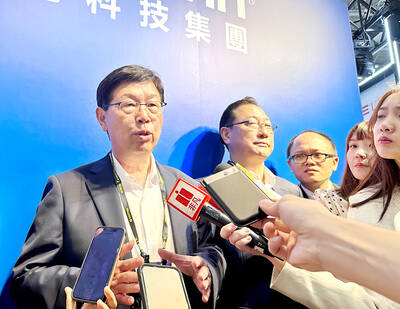Australia will suffer its biggest economic contraction since the 1930s in the first half of this year due to containment measures to curb the spread of COVID-19, Reserve Bank of Australia (RBA) Governor Philip Lowe said yesterday.
Describing the contraction as a “once in a century event,” Lowe said that national output would fall by about 10 percent in the first half of this year, with most of the decline likely in the June quarter.
Unemployment is seen at about 10 percent by June as total hours worked are likely to decline by about 20 percent, Lowe added.

Photo: EPA-EFE
The jobless rate last month was 5.2 percent.
“These are all very large numbers and ones that were inconceivable just a few months ago,” Lowe said in a speech in Sydney. “They speak to the immense challenge faced by our society to contain the virus.”
Earlier, figures from the Australian Bureau of Statistics showed jobs recorded by the tax office payrolls system fell 6 percent between March 14 and April 4, suggesting about 780,000 job losses.
Australia has so far avoided the high numbers of COVID-19 casualties reported around the world after closing its borders and imposing restrictions on public movement.
Though the increase in new infections has slowed significantly in recent days, the country still has more than 6,600 cases, and economists have warned the government against easing social distancing rules too soon.
As entire sectors of the economy shut down, the conservative government announced a A$320 billion (US$201.82 billion) fiscal stimulus plan, while the RBA went all in cutting the cash rate to a record low of 0.25 percent and launching “unlimited” quantitative easing.
Lowe yesterday said it was likely the cash rate would stay at that level for a number of years, as inflation was expected to remain subdued.
“We will not be increasing the cash rate until we are confident that inflation is going to be between 2-3 percent on a sustainable period,” Lowe said in response to questions.
“It’s quite likely that we have the current setting of interest rate for a number of years and this is reinforced by our target on three-year bond yield of 25 basis points,” he added.
Lowe said he was hopeful a recovery could begin within the next three to four months, if restrictions remained in place for now, but that a recovery would be slow.
“Whatever the timing of the recovery, when it does come, we should not be expecting that we will return quickly to business as usual,” he said. “Rather, the twin health and economic emergencies that we are experiencing now will cast a shadow over our economy for some time to come.”

Taiwan Transport and Storage Corp (TTS, 台灣通運倉儲) yesterday unveiled its first electric tractor unit — manufactured by Volvo Trucks — in a ceremony in Taipei, and said the unit would soon be used to transport cement produced by Taiwan Cement Corp (TCC, 台灣水泥). Both TTS and TCC belong to TCC International Holdings Ltd (台泥國際集團). With the electric tractor unit, the Taipei-based cement firm would become the first in Taiwan to use electric vehicles to transport construction materials. TTS chairman Koo Kung-yi (辜公怡), Volvo Trucks vice president of sales and marketing Johan Selven, TCC president Roman Cheng (程耀輝) and Taikoo Motors Group

Among the rows of vibrators, rubber torsos and leather harnesses at a Chinese sex toys exhibition in Shanghai this weekend, the beginnings of an artificial intelligence (AI)-driven shift in the industry quietly pulsed. China manufactures about 70 percent of the world’s sex toys, most of it the “hardware” on display at the fair — whether that be technicolor tentacled dildos or hyper-realistic personalized silicone dolls. Yet smart toys have been rising in popularity for some time. Many major European and US brands already offer tech-enhanced products that can enable long-distance love, monitor well-being and even bring people one step closer to

RECORD-BREAKING: TSMC’s net profit last quarter beat market expectations by expanding 8.9% and it was the best first-quarter profit in the chipmaker’s history Taiwan Semiconductor Manufacturing Co (TSMC, 台積電), which counts Nvidia Corp as a key customer, yesterday said that artificial intelligence (AI) server chip revenue is set to more than double this year from last year amid rising demand. The chipmaker expects the growth momentum to continue in the next five years with an annual compound growth rate of 50 percent, TSMC chief executive officer C.C. Wei (魏哲家) told investors yesterday. By 2028, AI chips’ contribution to revenue would climb to about 20 percent from a percentage in the low teens, Wei said. “Almost all the AI innovators are working with TSMC to address the

FUTURE PLANS: Although the electric vehicle market is getting more competitive, Hon Hai would stick to its goal of seizing a 5 percent share globally, Young Liu said Hon Hai Precision Industry Co (鴻海精密), a major iPhone assembler and supplier of artificial intelligence (AI) servers powered by Nvidia Corp’s chips, yesterday said it has introduced a rotating chief executive structure as part of the company’s efforts to cultivate future leaders and to enhance corporate governance. The 50-year-old contract electronics maker reported sizable revenue of NT$6.16 trillion (US$189.67 billion) last year. Hon Hai, also known as Foxconn Technology Group (富士康科技集團), has been under the control of one man almost since its inception. A rotating CEO system is a rarity among Taiwanese businesses. Hon Hai has given leaders of the company’s six